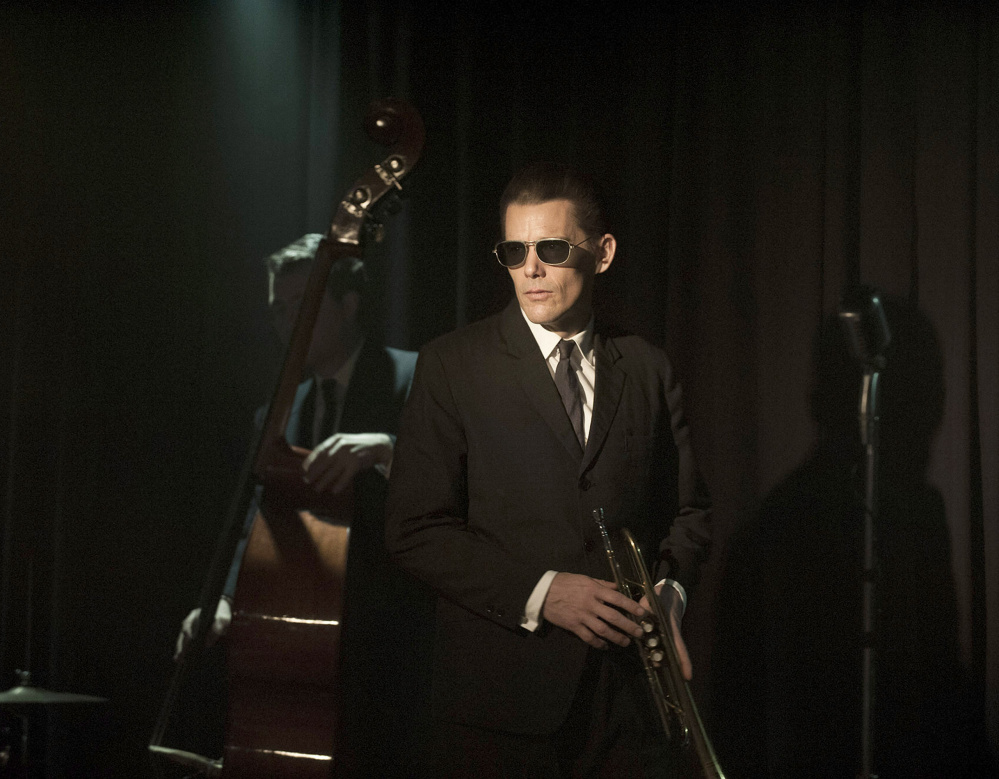Sometimes known as the James Dean of jazz, trumpeter Chet Baker was among the most photogenic of jazz musicians. Yet by the time he died in 1988, a descent into heroin addiction had so transformed his once-boyish appearance that he looked far older than his 58 years.
Baker’s rise in the music scene and perilous fall is natural fodder for a biopic, and “Born to Be Blue” is a particularly resonant story, providing a meaty role for Ethan Hawke, a veteran actor who is losing the youthful bloom that launched his career.
The film opens in 1966 as Hawke’s Baker lies on the floor of an Italian jail cell, tormented by the hallucination of a tarantula crawling out of his trumpet. He’s bailed out by a Hollywood producer who wants to put him in a movie – about Chet Baker.
“Blue” quickly flashes back to 1954, when Baker topped jazz polls, even beating out Miles Davis (the subject of the recently released Don Cheadle film “Miles Ahead”). Yet Hawke looks too old to play the younger Baker, and his trumpet playing sounds compromised. What we’re seeing, in effect, is the film within the film: a damaged older Baker playing his younger self.
After Baker’s drug dealer beats him so badly that doctors tell him he’ll never play trumpet again, the movie-within-the-movie is shelved. (This is one of a number of episodes where “Blue” takes dramatic license with facts: Baker completed several movies in America and Italy in the 1950s and 1960s.) The film gains strength as Baker heals, with the help of his girlfriend (Carmen Ejogo).
Despite staying off drugs and getting his career back on track, such weaknesses as petty jealousy threaten to derail his progress. These are among Hawke’s most effective scenes, and they take advantage of the depth and conflict apparent in the aging face of a once young and callow actor.
As the film progresses, its visual resonance with the iconic photographs of Baker feels more organic and less forced. By the final act, it’s chilling how much Hawke has transformed into the late-career musician, looking aged well beyond his years.
Baker’s dire injury forced him to redevelop his playing technique, which led to a new depth in his music. It’s the same difference we hear between Baker’s effortless 1950s vocals and the wounded voice of his later comeback. The film takes its time reaching that transition, but when it does, it’s heartbreaking.
Late in the film, Baker explains, at a comeback gig: “Miles (Davis) said, ‘Come back when you’ve lived a little.’ I’ve lived a little.” In the same way, “Born to Be Blue” is a stronger film once it has too.
Copy the Story LinkSend questions/comments to the editors.



Success. Please wait for the page to reload. If the page does not reload within 5 seconds, please refresh the page.
Enter your email and password to access comments.
Hi, to comment on stories you must . This profile is in addition to your subscription and website login.
Already have a commenting profile? .
Invalid username/password.
Please check your email to confirm and complete your registration.
Only subscribers are eligible to post comments. Please subscribe or login first for digital access. Here’s why.
Use the form below to reset your password. When you've submitted your account email, we will send an email with a reset code.